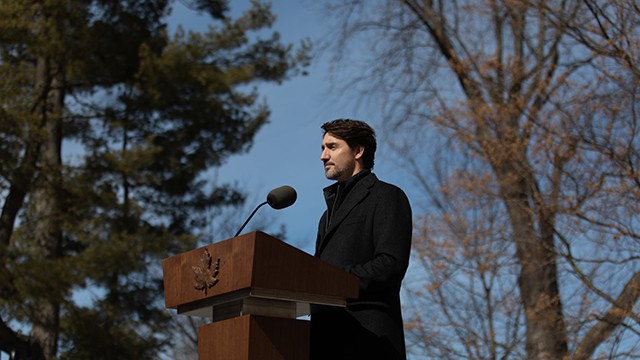Trudeau addresses reports about U.S. considering stationing troops along Canada/U.S. border
Published March 26, 2020 at 4:44 pm

On March 26, Prime Minister Justin Trudeau updated residents on the government’s evolving response to the COVID-19 pandemic, touching on financial aid, stricter quarantine act measures, credit card interest rates and a Global News report that the United States is considering deploying troops to the Canada/U.S. border to monitor for “irregular” crossings.
Appearing before reporters in front of his home at Rideau Cottage, Trudeau reiterated that Bill C-13, the COVID-19 Emergency Response Act, has received Royal Assent.
The plan aims to provide direct support to Canadian workers and businesses, plus $55 billion through tax deferrals, to help meet the cash needs of Canadian businesses and households, and to help stabilize the economy.
“Yesterday, our emergency plan was passed by Parliament with more generous measures,” Trudeau said, adding that the plan will provide billions of dollars in aid for workers, families and businesses who are suffering financially due to the COVID-19 crisis.
The Canada Emergency Response Benefit (CERB), which will replace the two benefits announced last week, will provide a taxable benefit of $2,000 a month for up to four months to support workers who lose their income as of result of the COVID-19 pandemic.
The government says the benefit will cover Canadians who have lost their job, are sick, quarantined, or taking care of someone who is sick with COVID-19, as well as working parents who must stay home without pay to care for children who are sick or at home because of school and daycare closures.
Additionally, workers who are still employed, but are not receiving income because of disruptions to their work situation related to COVID-19, would also qualify for the CERB. The CERB is available to Canadian workers affected by the current situation whether or not they are eligible for Employment Insurance (EI).
Trudeau told reporters that an online portal will be launched as soon as possible so that residents can apply for the benefit.
Yesterday, Trudeau said the government is aiming to launch the portal by April 6.
“We’re doing everything we can to shorten the deadlines and working as quickly as possible to get money in your pockets,” Trudeau said.
Reporters asked Trudeau to address a recent report that suggests the U.S. military could station troops along the border, reportedly in an effort to discourage “irregular” border crossings (which multiple reports suggest are on a decline since Canada promised to send such migrants back to the U.S.).
“We have the longest unmilitarized border in the world and it’s in our interest that it remains that way. We have been in discussions with the U.S. on this,” Trudeau told reporters, adding that not having soldiers stationed along the border benefits both Canada and the U.S. and the countries’ economies.
According to Global, the plan–if implemented–would see troops stationed about 30 kilometres from the border between official points of entry. The article says the troops would use sensor technology to detect irregular crossers before passing on the information to border patrol agents.
Global says U.S. sources told the news organization that the troops would not have the power to arrest or detain anyone and that the measure would be temporary and only in place throughout the duration of the pandemic.
Trudeau also told reporters that he recently spoke to other G20 leaders.
“We can only overcome COVID-19 if we take action together as a global community,” he said.
Trudeau said leaders discussed making sure the World Health Organization and public health organizations have the resources they need to develop treatment and vaccines. He said leaders also discussed the best ways to get medical equipment to people who need it.
“We’re working closely to coordinate efforts to protect the global economy. It demands a global response, we must work with allies to protect people and the economy,” Trudeau said.
Trudeau also took a few moments to comment on the government’s recent move to impose significant penalties on people who refuse to follow strict advice to self-isolate after returning to Canada from abroad.
A new Emergency Order under the Quarantine Act now requires any person entering Canada by air, sea or land to self-isolate for 14 days whether or not they have symptoms of COVID-19. The country is no longer using an honour system and is prepared to fine or imprison those who do not go straight home–and stay home–for 14 days after travel.
“The premiers, Dr. Theresa Tam and public health officials have all been very clear. If you’ve returned from abroad, you have to go home and stay home,” Trudeau said.
“People are shopping for groceries or getting together with friends after March break. This isn’t just disappointing, it’s dangerous. Therefore we are making it mandatory. You could face a stiff penalty or be sent to prison. What we’re asking you is not difficult. Stay home, wash your hands, keep a proper distance from others and call friends instead of visiting them. We all want to see life go back to normal as soon as possible, but everyone has to do their part.”
The government says it will do spot checks to ensure compliance.
Trudeau also fielded an important question about whether or not the government will encourage credit card companies to lower interest rates in response to the crisis.
Trudeau told reporters that the federal government is having that conversation with major banks in Canada and that Finance Minister Bill Morneau been encouraging companies to take such measures.
Trudeau also said the government is looking to give people access to more credit with lower interest rates.
Trudeau also told reporters that the government is still working to repatriate Canadians are who still abroad and unable to get home.
Cover photo courtesy of The Canadian Press
INsauga's Editorial Standards and Policies

